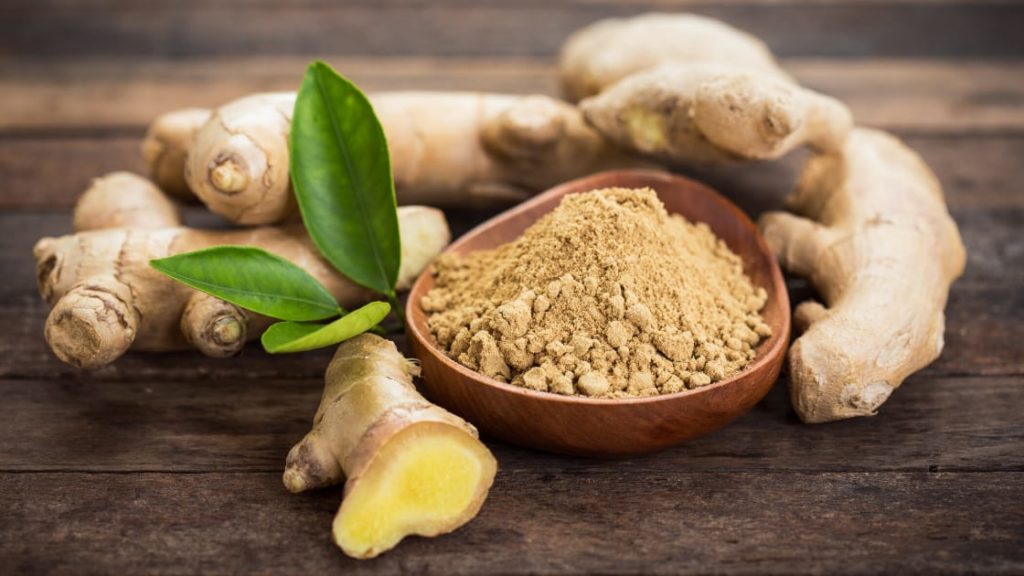Eating Ginger for Your Stomach

Do you ever feel like your stomach straight-up hates you? Yeah, me too.
Sometimes, I feel like there’s nothing I can do to appease it. Foods that seem to settle well with everybody else, such as wholesome apples and carrots, seem to literally hate my guts. And you know those medications that taste like the chalky Halloween candy that often goes uneaten? They seem to hate my guts even more than the carrots and apples combined. About one-third of my life can be summed up as one really long stomach ache.
Well, that’s how my life is summed up when I don’t have gut-friendly foods hanging around the house. And who is my guts’ favorite friend to have hanging around the house, you ask? Why, it’s ginger root! And kombucha, miso, and lots of fermented vegetables, too. But let’s talk about ginger! It’s been used for millennia, predominantly in Asia, to treat upset stomachs. Pitiful stomachs like my own can attest as to why!
Why Ginger Is So Great
Gingerol and shogaols, the phenolic compounds found in ginger, are responsible for the root’s pungent taste. But that’s not all they’re responsible for! Both compounds contain antioxidant and anti-inflammatory properties, which play a role in their therapeutic qualities.
Ginger for Your Stomach and Nausea Relief
Ginger’s most popular medicinal use is for nausea relief. In recent years, many studies have been conducted on different causes of nausea and how they may be impacted by ginger consumption. Research has narrowed in on causes such as pregnancy, anxiety, chemotherapy, and post-surgery discomfort. In the studies, control groups were either given prescription medications or no medications, and the experimental groups were given ginger supplements — some consumed ginger only, whereas some took it in addition to medication. The results showed that ginger’s compounds relax the gastrointestinal muscles similarly to the medications, leading to nausea relief in the majority of patients studied.
Anti-Inflammatory
Also, ginger’s anti-inflammatory properties have been shown to assist blood pressure regulation, by supporting the release of hormones such as angiotensin and aldosterone. High blood pressure, which can lead to all sorts of health problems, is another cause of nausea. Well, even if you aren’t having any nausea, eating ginger for blood pressure regulation sounds like a nice idea!
Indigestion
Now, let’s just talk about general indigestion. While nausea is usually (if not always) accompanied by a stomach ache, stomach aches aren’t always accompanied by nausea. Indigestion, also called dyspepsia, is just as common as it is uncomfortable. It’s usually not due to an underlying serious problem, and is oftentimes a result of food gone wrong. Food gone wrong — whether it’s caused by overeating, eating too fast, food intolerance — stirs up the stomach acids and gives you that nasty sour feeling in your abdomen.
My stomach feels gross just thinking about stomach acid, how about yours?
But if you have ginger at home, there’s good news for you and bad news for the acid. Ginger is an alkaline food. While its bioactive compounds are relaxing your gastrointestinal muscles and lessening gastric contractions, the ginger is putting its alkalinity to use and neutralizing that stomach acid. Hooray for alkalinity!
With all of its aforementioned qualities, ginger is also pretty good at tackling gas pains. Gingerol and shogaols stimulate your body’s digestive enzymes, speeding up your digestion. When your stomach can empty itself faster, gases can move through the intestines more quickly, easing all that bloating and abdominal pain.
Now how cool is all of that? Seems like our friend ginger has a lot going for it! However, there are some things to consider.
Things to Consider
- The levels of gingerol and shogaols will vary depending on how you ingest ginger. Fresh ginger root contains a higher concentration than the ground spice, but it’s still hard to know exactly how much you’re consuming. The only way to gauge the precise amount of these compounds is by taking ginger in supplement form.
- As with many forms of alternative medicine, the research on ginger’s therapeutic effects are a little limited. Many studies have been conducted, but the experimental/control groups have been relatively small.
- The ideal dosage of ginger has yet to be determined. Ginger is considered a safe for most people, but ingesting too much of anything can cause bodily harm. You don’t want to cause the opposite effect of what you’re trying to do by overdoing it.
- While very uncommon, ginger allergies do exist. The most common allergic reaction is a skin rash. In rare cases, more serious symptoms can occur, such as coughing, swollen throat, congestion, and/or vomiting. If you want to be extra cautious, get an allergy test before adding more ginger to your diet.
So what are you going to do now?
Assuming you don’t have a rare ginger allergy, try boiling some fresh ginger and making tea! Or sprinkle some extra spice on an Asian dish. And if you’re not crazy about ginger’s taste and have consulted your physician, head to the health food store and buy some supplements!
Have some ginger for your stomach and have a happy stomach!
Written by: Katrina Jenkins, LMT
Photo credit: Canva
Resources:
- https://www.ncbi.nlm.nih.gov/pmc/articles/PMC6341159/
- https://www.researchgate.net/publication/280318471_Effect_of_dietary_supplementation_of_ginger_and_turmeric_rhizomes_on_angiotensin-1_converting_enzyme_ACE_and_arginase_activities_in_L-NAME_induced_hypertensive_rats
- https://www.ncbi.nlm.nih.gov/pmc/articles/PMC4818021/
- https://www.ncbi.nlm.nih.gov/pubmed/30680163





